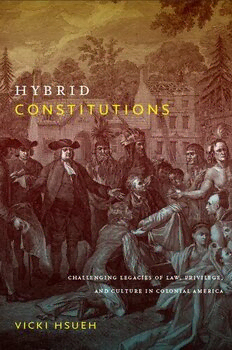
Hybrid Constitutions: Challenging Legacies of Law, Privilege, and Culture in Colonial America PDF
Preview Hybrid Constitutions: Challenging Legacies of Law, Privilege, and Culture in Colonial America
Hybrid Constitutions Constitutions Hybrid Challenging Legacies of Law, Privilege, and Culture in Colonial America Vicki Hsueh Duke University Press Durham and London 2010 © 2010 Duke University Press All rights reserved Printed in the United States of America on acid-free paper ¥ Designed by Heather Hensley Typeset in Minion Pro by Achorn International, Inc. Library of Congress Cataloging-in-Publication Data appear on the last printed page of this book. Duke University Press gratefully acknowledges the support of Western Washington University, which provided funds toward the production of this book. contents Acknowledgments vii 1 Hybrid Constitutionalisms: Unsettling the Empire 1 of Uniformity 2 “Not Repugnant or Contrary”: Law, Discretion, 25 and Colonial Founding in Maryland 3 Giving Orders: Theory and Practice in the 55 Fundamental Constitutions of Carolina 4 Under Negotiation: Treaty Power and Hybrid 83 Constitutionalism in Pennsylvania 5 Negotiating Culture: Plurality and Power in 113 Hybrid Constitutionalism Notes 135 Bibliography 163 Index 183 Acknowledgments This project began with a seminar paper, developed into a thesis, and eventually became a book. Throughout all of these stages, I have received the help, encouragement, support, and generosity of many colleagues, friends, and family. It is a privilege to have such debts. This book would not have been possible without funding and research opportunities provided by Western Washington University, Oberlin College, Johns Hopkins University, the John Carter Brown Library, the American Antiquarian Society, and the Huntington Library. Special thanks to Norman Fiering at the John Carter Brown, Caroline Sloat at the American Antiquarian Society, Robert Ritchie at the Huntington Library, and Frances Ferguson at Johns Hopkins for their generous support. Western Washington University (wwu) has been a wonder- ful place for scholarship and teaching. I thank Ron Kleinknecht, Sara Weir, and the Office of Research and Sponsored Programs for providing research grants, leave time, and publishing assis- tance crucial for the completion of the book. My colleagues in the Department of Political Science have been a continual source of warmth, encouragement, and camaraderie. I feel fortunate in- deed to be part of such a generous community and to have col- leagues whom I happily call friends. I credit a large portion of my easy acclimatization to wwu to Joan Blackwell and Debbi Enge- bretson, who have both helped me navigate the department and the university with their kind wisdom and advice. My students are a continuing source of challenge, satisfaction, and humor. Friends in the Pacific Northwest and in more far-flung parts have sustained me over the years with their love of reading, writing, lively conversation, stomping outdoors, and delectable food and drink. My thanks and gratitude to Amir Abedi, Rachel Ablow, Olga Akselrod, Jeff Alexander, Bidisha Biswas, Blanche Bybee, Ha-Kyung Choi, Becky Don- nino and Kevin Smith, Ruth Harper, Michelle Hornof, Cynthia Horne, Jean Kim, Sarah Knight, Marc Johnson, Stormy Medler, Chandra Mitch- ell, Emma and Chad Norman, Niall O’Murchu, Kimberly Peters, Shawne Sanders, Paul Saurette, Jennifer Seltz, Lisa Siraganian, Kathy Trevenen, and Kathryn and Adam Resnick for their support, encouragement, and friendship. During the past couple of years, I have presented chapters and excerpts from this book to various audiences. The following scholars were kind enough to read those early drafts, and I am exceedingly grateful to them for their comments, advice, and criticism: Richard Boyd, Cornelia Dayton, Monique Deveaux, Jason Frank, David Hall, Tim Harris, Laura Janara, Sonia Kruks, James Muldoon, Davide Panagia, J. G. A. Pocock, Mark Re- inhardt, John Tambornino, James Tully, Harlan Wilson, and Natalie Zacek. I am particularly indebted to Barbara Arneil, Judith Butler, Marianne Constable, Bonnie Honig, Jacob Levy, Jill Locke, Laurie Naranch, Torrey Shanks, Verity Smith, Sarah Song, Mark Warren, and Iris Marion Young for valuable discussions during the later stages of manuscript revision, which honed and sharpened my thinking on the dynamics of constitu- tionalism and colonialism. This study first took form at Johns Hopkins University, and many people there helped me to develop the earliest version of the project. My deep thanks to Amanda Anderson, Felicity Callard, William Connolly, Jenni- fer Culbert, Theo Davis, Frances Ferguson, Richard Flathman, Eduardo González, Siba Grovogui, Sarah Hill, Ruth Leys, Ruth Mack, David Mar- shall, John Marshall, Anthony Pagden, Rina Palumbo, Shilpa Prasad, Patrick Provost-Smith, Kam Shapiro, Gabrielle Spiegel, Nancy Struever, Anoush Terjanian, and Amit Yahav-Brown. One person deserves special, heartfelt, and, in many ways, inexpressible thanks: Kirstie McClure. Her unflagging encouragement not only spurred the study from the first, but also sustained its development throughout its many incarnations. I remain inspired by her acuity, care, and tacit knowledge. viii Acknowledgments It was a special pleasure to work with Courtney Berger at Duke Univer- sity Press. Her enthusiasm and support were remarkable, and I am grate- ful for her time, consideration, and wisdom in guiding me through this process. Mark Mastromarino and Susan Deeks were generous with their support and guidance in the final stages of the book. Last but absolutely not least, the two anonymous readers for Duke University Press were un- commonly generous with their insightful, detailed, and comprehensive comments. Their contributions were invaluable, and I learned much from their different and complementary perspectives. All subsequent errors, of course, are my own. I dedicate this book to my family. They are the most idiosyncratic, in- corrigible, hilarious, and wise people I know. They live their lives with joy, generosity, bravery, humor, and intelligence—they are my inspiration and have my love and affection always. Earlier versions of sections of Chapter 3 were originally published in: “Un- settling Colonies: Locke, ‘Atlantis’ and New World Knowledges,” History of Political Thought 29 (2008): 295–319; “Cultivating and Challenging the Common: Lockean Property, Indigenous Traditionalisms, and the Prob- lem of Exclusion,” Contemporary Political Theory 5 (2006): 193–214; “Giv- ing Orders: Theory and Practice in the Fundamental Constitutions of Caro- lina,” Journal of the History of Ideas 63 (2002): 425–46. Acknowledgments ix
